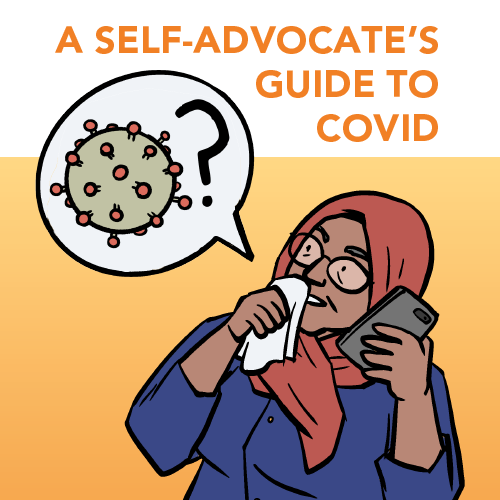A Self-Advocate’s Guide To Covid
Last Revised: May 2025
IHPP guides are for educational purposes only. The illustrations and information about anatomy are for learning about the human body, health conditions, and preparing for appointments. These guides should not be used to diagnose or treat any health problems. These guides are not a replacement for seeing a licensed medical professional. Please talk with your healthcare provider if you have questions or concerns about your health.
Transcript:
A Self-Advocate’s Guide to COVID
Created by the Vermont Developmental Disabilities Council.
This guide helps you understand COVID-19 and how to stay safe.
It explains how the virus spreads, what to do if you get sick, and how to protect yourself and others.
What is this guide for?
To help you understand COVID-19 and how to lower your risk of getting it or spreading it to others.
COVID is a virus that spreads through the air when someone coughs, sneezes, or talks. You can get it even if someone doesn’t look sick.
There are different kinds of COVID called variants. Some are easier to catch than others.
How can you stay safe?
Spend time outside when possible.
Wear a mask indoors when around others.
Open windows or use air purifiers for fresh air.
Wash your hands often and use hand sanitizer.
Stay up to date with COVID vaccines and boosters.
Why do you need vaccine shots and boosters?
Vaccines help keep you from getting very sick or going to the hospital.
Boosters are extra vaccine shots that help your body keep fighting the virus. You can get a booster every 6 months.
What if you were around someone with COVID?
Take a COVID test at home or with a healthcare provider.
Stay away from others until you know if you’re sick.
Watch for symptoms like:
Fever
Cough
Sore throat
Headache or body aches
Trouble breathing
Tiredness
Upset stomach
Loss of smell or taste
How do you get a test?
You can get a home test from a pharmacy.
Or visit a healthcare provider.
Medicaid may cover the cost.
You can also call 888-677-1199 or visit DIAL.ACL.gov
What happens when you get a test?
A provider uses a soft swab to gently test your nose.
It might tickle or feel weird, but it won’t hurt.
You wait for results, then a doctor calls you.
At home, you follow the kit instructions and call your provider if it shows you might have COVID.
What if you test positive for COVID?
Isolate yourself at home and stay away from others.
Wear a mask and stay 6 feet away if you share space.
Open a window for fresh air.
After 5 days, test again.
If negative, you can be with others again.
If positive, stay isolated and keep testing until negative.
Tell your doctor you have COVID.
Let others know that you may have exposed them.
What is The Inclusive Healthcare Partnership Project (IHPP)?
The Inclusive Healthcare Partnership Project helps people with developmental disabilities get health information that is easy to understand.
It also trains healthcare providers to communicate better with neurodiverse patients.
IHPP Goals:
Create plain language health materials by and for people with developmental disabilities.
Help doctors and nurses communicate clearly with all patients.
Last revised: January 2025
This project is supported in part by the Administration for Community Living (ACL), U.S. Department of Health and Human Services (HHS). Award: $95,319. Contents do not necessarily reflect the views of ACL/HHS or the U.S. Government.
Learn more at: http://www.ihppvt.org
Sources:
American Medical Association. (2023). End of COVID-19 public health emergency. https://www.ama-assn.org/system/files/covid-19-phe-resources.pdf
See also Frequently Asked Questions from Patients about COVID Treatments (January 2023).
See also When to Get Medical Care for COVID (January 2023).
Dartmouth Hitchcock Medical Center. (2024, January 24). How do you know if you have COVID-19, flu, or RSV? https://www.dartmouth-hitchcock.org/stories/article/how-do-you-know-if-you-have-covid-19-flu-or-rsv#:~:text=COVID%2D19%20is%20different%20from,of%20taste%20and%2For%20smell.
Desroches, M. L., et.al. (2022). Supporting the needs of people with intellectual and developmental disabilities 1 year into the COVID‐19 pandemic: An international, mixed methods study of nurses' perspectives. Journal of Policy and Practice in intellectual disabilities, 19(1), 48-63. https://doi.org/10.1111/jppi.12411
Green Mountain Self-Advocates. (2020, June 15). A self-advocate’s guide to COVID-19. https://gmsavt.org/resources/a-self-advocates-guide-to-covid-19
(2023, September 7). COVID-19 update. https://gmsavt.org/wp-content/uploads/2023/10/COVID-Update-9.7.23.pdf

